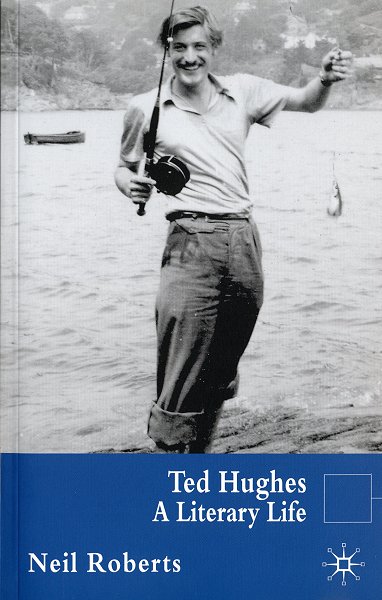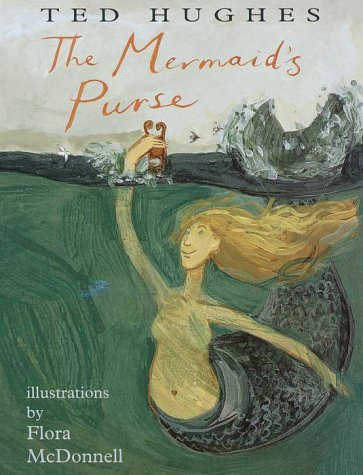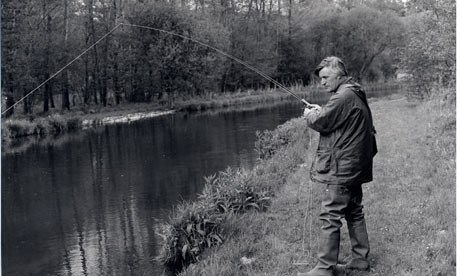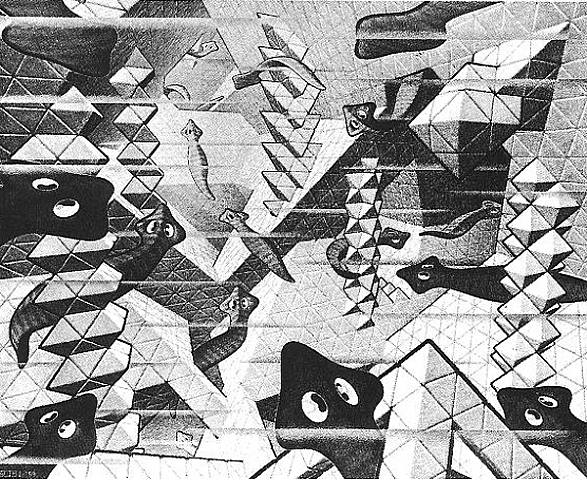ANGLING FOR LOVE: There’s A Memory On The End Of That Hook
(Ted )Hughes’s love of fishing was learned growing up in Yorkshire, but it became “a kind of metaphor for the creative act,” says Foss.”This idea of pulling something out of the darkness, into the light of consciousness.” ….He was an excellent fisherman, he just had that gift of opening people’s eyes to what was around him,” …”He taught them so much, about fishing and nature. He gave them the gift of being able to see things around them in a new light and the value of nature. “He just liked being in touch with nature – that sounds a bit trite, but he loved the idea of man versus fish.”

---He waited until the faceless, featureless figure ascending it had moved on to another level, then he took a marker and started drawing. “We are here,” he said, pointing to a Red Oblong. “And this is where we’re headed. The Red Abyss.” He had sketched a beautiful, perfect large asterisk. “The Red Abyss is an asterisk?” T.S. Eliot asked. “How will we enter it and what happens once we’re inside?” M.C. Escher smiled. The faceless, featureless figures stopped moving and peered down from their staircases and balconies. “The Red Abyss is the Heartland of the Chamber of Sorrow at the end of the Vanishing Point this sea-road has made from faith and determination.---
Nobody likes me, everybody hates me,
Think I’ll go eat worms.
Big fat juicy ones, Eensie weensy squeensy ones,
See how they wiggle and squirm.
Chomp off their heads and squeeze out the juice
And throw their tails away
Nobody knows how I survive
On worms three times a day.
Worms three times a day. The worm on the end of your hook may be your memory.A substitute for throwing a human sacrifice into a pyre of water and retrieving a lost life or a forgotten memory. … ”While other experimental psychologists ran rats through mazes to study how creatures learn and remember, McConnell chose to “run” a type of flatworm called Planaria. Planarians can multiply by fission; that is, if a worm is cut in two, the head end will survive and grow a new hind end. While the hind end will also survive and grow a new head, including the organ that serves as a brain….Then Dr. McConnell reported that when he cut some trained worms and they had grown new parts, the “new” worms demonstrated that they remembered their training by quickly learning to scrunch up or writhe at the bright light. For worms whose head ends had taken part in the shock training, this seemed plausible, since if there were any memories they should reside in the brainier part of the worm. But the new worms– whose hind ends alone had been in the original training program–also showed the same recollections, so where was the seat of memory now?”
…The newly unveiled journals of Ted Hughes have revealed how many of his poems were inspired by fishing trips to Scotland, …(Tim Cornwell). …and diaries also reveal another of Hughes’s passions – for fishing. There are 20 fishing journals, mixing memories and impressions with accounts of a good catch….”Maybe the prettiest and most satisfying days’ fishing I ever had. The loneliest place – the most unpredictable fishing,” he wrote after one trip….
A possible theory, McConnell surmised, was that if the memory molecules were the same from one worm to another, a worm could be trained, the chemicals extracted from it, and then somehow injected into another worm. A form of memory transfer.
Hungry planarians are cannibalistic. So McConnell trained a group of ”victim” worms and then chopped them in pieces and fed them to an unsuspecting group of hungry cannibals. After the cannibals had had a chance to digest their meal, they were promptly given the same sort of training that the victims had been given. The cannibals that had eaten educated victims did significantly better, right from the very first trial, than the cannibals that had eaten untrained victims. Thus, the first inter-animal transfer of information had been achieved.
“It seems to me,” says the embattled psychologist, “that anyone who takes himself or his work too seriously is in a perilous state of mental health. I believe that the Digest is proof that a great many scientists can appreciate humor even when it’s pointed at their own life’s work, and that a scientist can be both half-serious and half-wit.”
The chemical involved in the transfer was RNA, ribonucleic acid, a giant molecule found in almost all living cells. This demonstrated that a type of memory transfer could be achieved using a crude extract of RNA taken from the bodies of trained planarians and injected into untrained worms.
”The Digest later published the first complete account of the original study of memory transfer in a higher animal, the rat. It also reported the first study of behavioral changes in plants—experiments in which the tropical mimosa was actually “taught” to change its response to specific stimuli.”
The original results were published in 1959, and not surprisingly no journalists took their work seriously. Unfortunately for them, hundreds of high school students across the U.S. did take them seriously and they were inundated with letters asking about the care and training of flatworms. Thus, the title of the manual, ”The Worm Runner’s Digest”, which as logo, had a crest of a rampant two headed worm and a Latin motto which translated as ”When I get through explaining this to you, you will know even less than before I started”. The logo also featured two diagonal stripes, which in the language of heraldry, a diagonal stripe across your escutcheon can mean you are descended from a bastard.

---In The Mermaid's Purse, Ted Hughes explores the ocean. From starfish and seagulls to mermaids and monsters, 28 poems capture the beauty, drama, and mystery of the sea and the seashore. Here is the ghostly cormorant: "Drowned fishermen come back/As famished cormorants/With bare and freezing webby toes/Instead of boots and pants."---
“…W.B. Yeats burst into the kitchen. It was 4am and he was flushed with the victory of his latest catch: a job-fish, a pike and a banjo-ray. He had cleaned and filleted them and was about to tell Duncan the details of the catch. Duncan said “What’s happening to you William? This fishing has become some kind of obsession. I remember the first days, when you fished with the old Golden Codgers for blackfish with green weed and floats – their was some elegance, some delicacy and even art involved in that. I could see what you were drawn in by—This rough fishing for pike eels with bullock hearts, well that was bad, but now you are fishing for just about any bottom feeder that comes along. What are you doing to yourself, it’s like some form of twisted self-abuse. Why are you doing this to yourself William, you are a great poet and yet you don’t even write fishing articles for Fishing World, you don’t write fishing poems, you simply fish for the scum of the river and seem happy to continue to do so, what gives?” W.B. Yeats looked at Duncan and replied “Well Robert, what happened to the promised transmigration of the soul ceremony?…” ( G. Lehmann )

Michael Morpurgo photo. Ted Hughes. Quarrington:This is, after all, a book about fishing, and in detailing this we get a sense of Hughes without any really sharp psychological insight. As I say, I count this as one of the book's charms. However, I found myself wondering, often, what lay behind the Angling Addiction. There is some mention of an older brother, apparently quite an angler and nimrod, and perhaps there is some clue as to his “problem” right there.
The Digest was really a house organ of an anti-scientific movement. It was the conviction of McConnell that most of what was wrong with science in his era was traced to the fact that Scientists were willing to make objective and dispassionate studies of any natural phenomena at all; except their own scientific behavior. That is, we know considerably more about flatworms than we do about the people who study flatworms. The Establishment never questions its own motives whereas the true humorist always does. It was McConnell’s belief that if the younger generation could be brought to the point of being able to laugh at itself, there would be hope to turn Science back into science.
ADDENDUM:
Fishing was very important for Hughes, both as recreation and as a metaphor of his poetry,” says the British Library’s curator of modern literary manuscripts, Rachel Foss.
She quotes the last lines of his poem Salmon-Taking Times:
So delicate
I touch it and its beauty-frailty crumples
To a smear of wet, a strengthless wreckage
Of dissolving membranes – and the air is ringing.
It is like a religious moment, slightly dazing.
It is like a shower of petals of eglantine.
The novelist and poet Robert Nye, who knows Hughes’s work and family well, points to his early poem, Pike. Hughes writes of the pond’s
Stilled legendary depth:
It was as deep as England. It held
Pike too immense to stir, so immense and old
That past nightfall I dared not cast.”
“He enjoyed fishing for himself, the physical thing, but also metaphorically he saw it as an analogy for writing a poem,” Nye says. “Catching a fish was like writing a poem; Pike is very much about that.”





Hi, Dave, I am not able to access my twitter account, it seems was hacked, twitter says do not fit my username and email. Can you help me?
I would say it may be better to open a new account. They seem to be very slow in responding to problems of that nature.